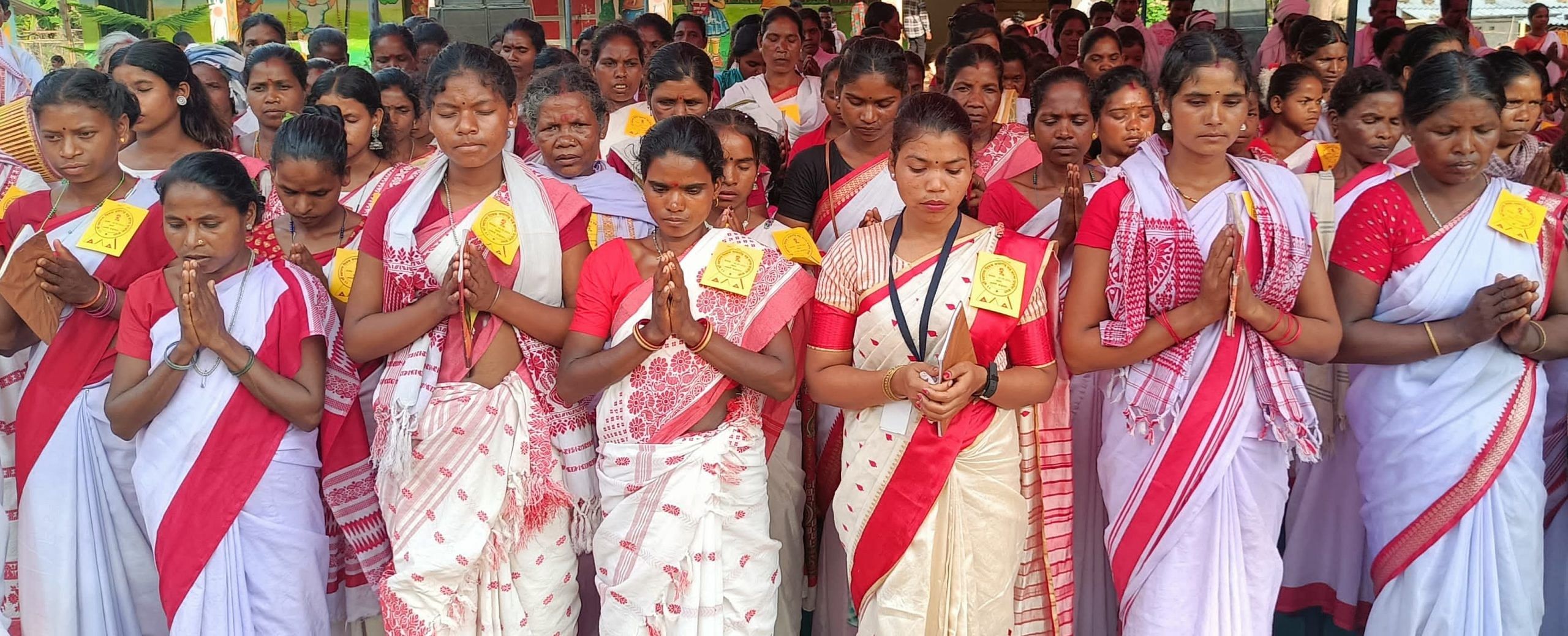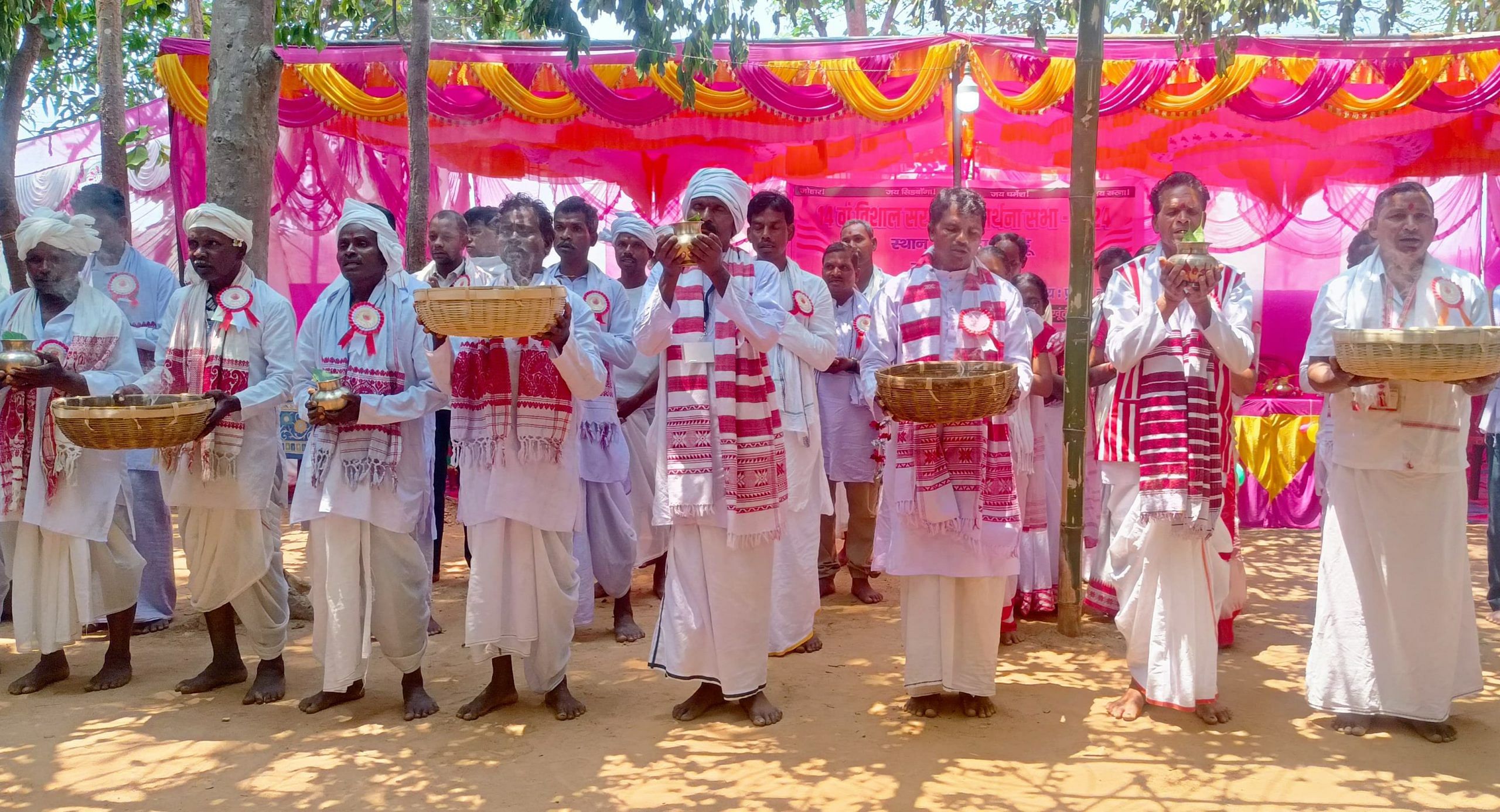Ranchi: Ahead of the Jharkhand assembly elections, Chief Minister Champai Soren has raised the pitch on the issue of a separate code for the Sarna tribal religion in the census — a long-pending and emotive demand among the state’s Adivasi population.
Centred around nature worship, the Sarna tribal religion is predominantly practised by Adivasi communities in Jharkhand, Odisha, Chhattisgarh, Assam and West Bengal. Although there was no separate code — only Hinduism, Islam, Christianity, Sikhism, Buddhism and Jainism have their own — around 50 lakh people recorded their religion as Sarna in the 2011 census.
Proponents of a separate Sarna code argue that it’s key to protecting the faith and Adivasi traditions, and stemming religious conversion. The demand has been at the heart of many agitations in Jharkhand, which has a 26.2 percent Scheduled Tribe (ST) population according to the 2011 census.
Consequently, it’s been a major political issue, with the Jharkhand assembly passing a resolution demanding a ‘Sarna tribal religion’ code in a special session in 2020. During the Lok Sabha election campaign, both the ruling Jharkhand Mukti Morcha (JMM) and its ally, the Congress, tried to corner the Bharatiya Janata Party (BJP) over the Sarna code.
Political analysts say it worked — the BJP was confident heading into the polls, but the INDIA bloc won all five seats reserved for STs in the state. Now, with the assembly elections due in November-December, the BJP faces a tough battle against the ruling alliance.
There are 28 assembly seats reserved for STs in the Kolhan, North Chotanagpur and Santhal Pargana divisions, which are crucial to gain power in the 81-member Jharkhand assembly. In 2019, the BJP had won only two of these seats.
It’s in this backdrop that Soren raised the issue on 23 June at an event in Ghatshila, East Singhbhum, organised by the Majhi Pargana Mahal — the traditional governance system of the Santhal tribe.
Soren said the state government had already removed all obstacles and accused the Centre of keeping it hanging as part of a conspiracy. He promised the representatives that they would have the Sarna code come what may.
Several JMM leaders echo Soren’s point about the demand being kept pending, said the party’s MPs would raise the issue in Parliament and that the BJP should make its stance clear.
The BJP, on the other hand, accuses the JMM and Congress of doing politics on this issue only for electoral mileage and of courting the Christian vote bank.
Political analyst Rajat Kumar Gupta says Soren raised the issue to galvanise tribal voters for the upcoming assembly elections.
“In the Lok Sabha polls, tribal people were emotionally attached to the issue of the Sarna code and the BJP’s stand was under question. Leaders like Champai Soren and Jairam Ramesh had cornered the BJP on this issue,” says Gupta.
The results show it worked, but the INDIA bloc also needs to take up the issue at central level or it could backfire, he adds.
Also read: Babulal Marandi losing hold among tribals? Jharkhand BJP chief faces state poll test after LS losses
‘Ancestors and nature are our gods’
Jal (water), jungle (forest), jameen (land) — these three aspects of nature form the core of the Sarna faith.
“Followers of Sarna are usually nature worshippers. Ancestors and nature are our gods and also the sustainers of our lives,” says des porenik (a functionary in the traditional Majhi Pargana system) Durga Charan Majhi of East Singhbhum.
Mathura Kandir, a functionary of the Sarna Dharma Soto — a committee that works for the interests of Sarna tribals — in Khunti district, says. “The place of worship in all tribal villages is called the Sarna place. Worshipers of nature follow the Sarna religion and its traditions, customs, ways of celebrating festivals and rituals from birth to death are different from those of other religions.”
Nowadays, Sarna dharma sabhas are organised in different tribal villages in Khunti district and prayers are offered to ‘Lord Singbonga’ for happiness, peace and prosperity.

“Lord Singbonga is not visible because we feel and accept nature as God,” says Soma Kandir, a dharma guru of the Sarna tribals.
Asked why a separate Sarna code is needed, Majhi says, “This issue is related to our existence and identity. We have been raising our voice for 20 years, but did not get the rights and authority. Hemant Soren’s government had passed the proposal in the assembly but till now, the Union government has not agreed to it.”
Mathura Kandir echoes his sentiments, and says the code would help strengthen “our culture, tradition, customs and religion”.
The common perception is that a separate religious identity will not only ensure effective protection of the identity, language tradition, culture and history of the tribes but also stem the practice of conversion, according to another tribal functionary.
The assertion of tribal identity is rooted in history and has been political from the very beginning, says Ashwani Kumar Pankaj, author of Shunyakal Mein Adivasi. He refers to the Constituent Assembly choosing to use the term ‘Scheduled Tribes’ instead of ‘Adivasi’ in the Constitution, and how then MP Jaipal Singh Munda had strongly opposed this in a debate on 2 December, 1948.
Pankaj adds that there was a separate tribal religion column in the census from 1871 to 1951, and asks why it was dropped when the Constitution talks about protection and respect for all religions and languages.
Also read: Friction in Jharkhand BJP ahead of state polls as Sita Soren blames party leaders for Lok Sabha loss
The political dimension
Calling the Sarna code “an issue of identity” JMM general secretary Supriyo Bhattacharya asks why it has been kept pending, and refers to a letter written by then CM Hemant Soren to Prime Minister Narendra Modi last year.
देश का आदिवासी समुदाय पिछले कई वर्षों से अपने धार्मिक अस्तित्व की रक्षा के लिए जनगणना कोड में प्रकृति पूजक आदिवासी/सरना धर्मावलंबियों को शामिल करने की मांग को लेकर संघर्षरत है।
मैंने पत्र लिखकर माननीय प्रधानमंत्री आदरणीय श्री @narendramodi जी से देश के करोड़ों आदिवासियों के हित… pic.twitter.com/svvzDaTq7C— Hemant Soren (@HemantSorenJMM) September 27, 2023
In the letter, Soren said Jharkhand’s tribal population had declined from 38 percent to 26 percent in the past eight decades and this would have an adverse effect on tribal development policies under the Constitution’s fifth and sixth schedules. He added that it wasn’t just Jharkhand — tribal people across the country had been demanding a separate Sarna/nature worship code for several years.
Bhattacharya adds that the JMM MPs will definitely raise their voice on this issue in the House, and BJP MPs from the state should clarify if they will do so, too.
Another JMM general secretary, Vinod Kumar Pandey, says a letter was sent to President Droupadi Murmu’s secretary on 4 March to request a meeting on the Sarna code and “other important issues”, but the party was informed this wasn’t possible due to time constraints.

However, Samir Oraon, a former MP who is the national president of the BJP’s ST Morcha, says the JMM and the Congress should first say whether their demand is for Jharkhand or for all the tribal people of India.
He adds: “Both the parties should clarify whether they are in favour of bringing back the tribals who have converted to another religion to their original faith. The truth is that the JMM and Congress want less protection for tribals and more nourishment for their vote bank, in which Christians are a big factor. The BJP, on the other hand, has always kept the tribals in its heart.”
Similarly, Leader of the Opposition Amar Kumar Bauri alleged that “even in the Lok Sabha elections, the JMM and the Congress have misled the innocent tribals by adopting various tactics. The interest of tribals is paramount for the BJP. None of the INDIA bloc’s tactics will be successful in the assembly elections.”
Sukhdeo Bhagat, the Congress MP from Lohardaga, held the Constitution in his hand and said he swore by the “Sarna Lord” when he took his oath as a member of the Lok Sabha on 24 June. Speaking to ThePrint, Bhagat said, “Sarna is a religious identity. They are raising this issue. There should be a separate code in the census.” He added that he would raise this issue strongly in Parliament, too.
There are tribal voices critical of both sides. The Adivasi Sengel Abhiyan is a movement agitating for a separate Sarna code and indigenous people’s rights in Jharkhand, Bihar, Chhattisgarh, Odisha, Assam, and West Bengal. Its president, former MP Salkhan Murmu, accuses the JMM of doing “vicious” vote-bank politics over the issue, while the BJP has “no heartbeat for tribals”.
He adds: “During the election campaign in Jharkhand, Rahul Gandhi had assured the tribals on this issue. If the JMM and Congress combine are serious on this issue, then both the parties should raise it honestly in Parliament.”
Laxminarayan Munda, the coordinator of another tribal organisation, Adivasi Samanvay Samiti, says the BJP had ignored the Sarna code demand while the JMM was raising the issue only for electoral purposes. Tribal interests are being torn between the two, he adds.
(Edited by Rohan Manoj)
Also read: Down from 3 to 0, what led to BJP’s whitewash in Jharkhand’s tribal seats in LS polls
